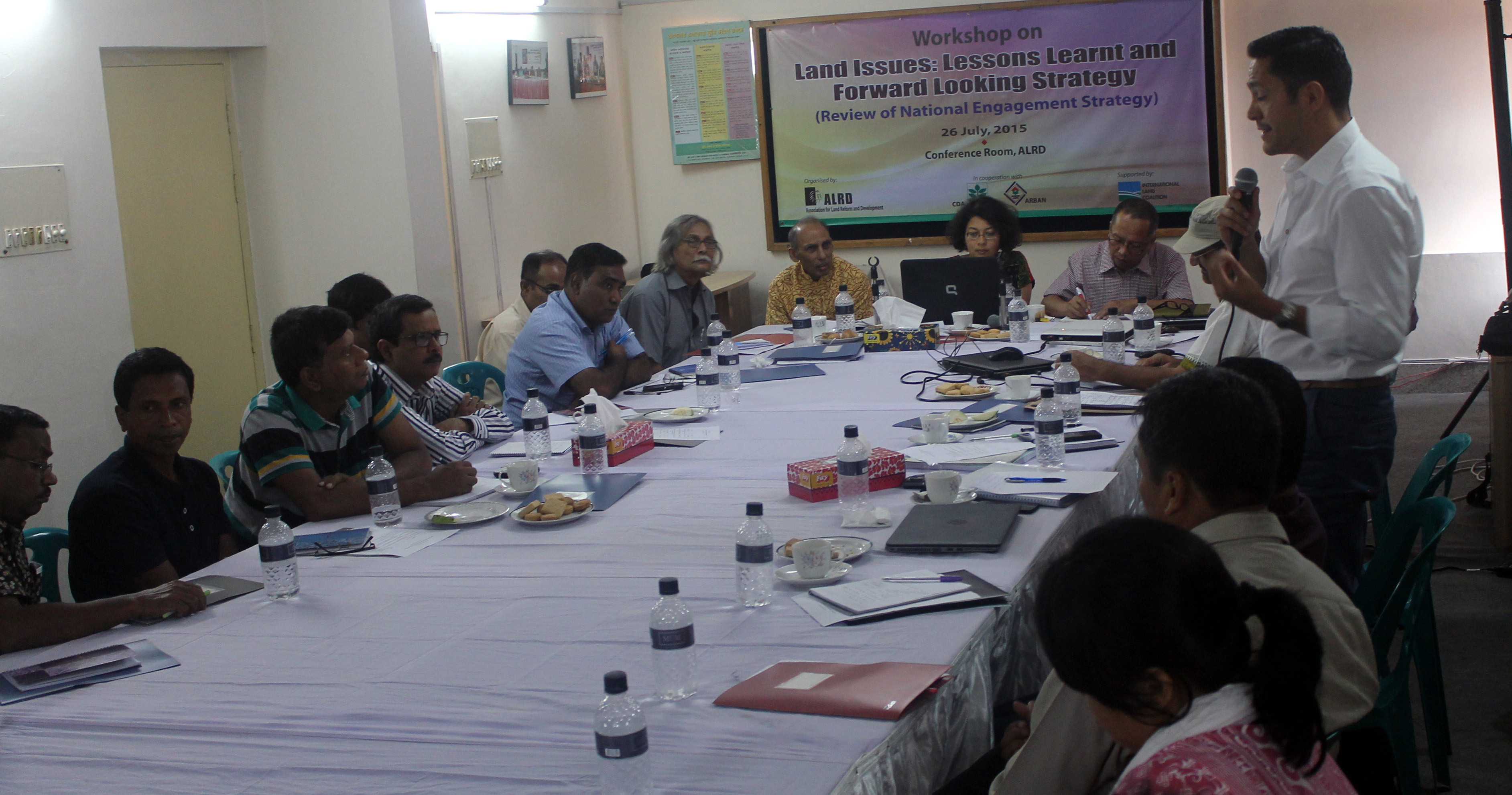Munities of the Workshop on "Land Issues: Lessons Learnt and Forward Looking Strategy" Held on 26 July, 2015 @ ALRD conference room

ILC representatives Karishma Boroowa and David Rubio from Rome, Italy and ILC Asia Facilitator Erpan Faryadi, based at the ILC Asia Regional Coordination Unit in Jakarta, Indonesia have visited Bangladesh from 26-31 July, 2015 intended to meet ILC country members through a workshop and jointly assess the outcomes of the interventions that have been carried out so far, and plan for the NES Bangladesh Year II formulation. in connection with ILC’s initiative, a workshop on “Land issues: Lessons Learnt and Forward Looking Strategy” organized by the ALRD in cooperation with other two ILC members CDA and ARBAN and with support from ILC held at ALRD Conference Hall at 1/3, Block- F, Lalmatia, Dhaka- 1207, Bangladesh on 26 July, 2015. The workshop started at 10.00 am with the welcome remarks by the Executive Director of ALRD Mr. Shamsul Huda and self introduction of all the participants present. After self-introduction the workshop progressed with the following agenda.
Agenda
- Welcome and introduction
- Presentation on International Land Coalition and its Asia Regional Platform (Erpan Faryadi)
- Presentation on National Engagement Strategy (NES) of ILC (Karishma Boroowa)
- Presentation on NES Bangladesh -process, issues, challenges and learning (Rowshan Jahan Moni)
- Presentation on NES Phase II (ILC)
- Open discussion Q. A (all)
- What next / Future strategy (ILC members)
A total of 40 representatives from the following organizations were present in the meeting, i.e. ILC secretariat, ILC Asia Regional Coordination Unit, ALRD, ARBAN, CDA, Kapaeeng Foundation, TIB, Action Aid Bangladesh, Nijera Kori, RULFAO, BFF, BIPF, SRS, NDF, ACDF, GBK, INCIDIN Bangladesh, Banchte Chai, CCDB, Nagorik Uddyog, GKS, and BELA.
About ILC and NES- International Land Coalition (ILC) is a global action network of 207 organizations from more than 60 countries working together to promote secure and equitable access to and control over land for poor women and men through advocacy, dialogue and capacity building. One of ILC’s main objectives is to influence land-related policies’ formulation and implementation at country level. Through its diverse membership, ILC consolidated multi-stakeholder platforms and processes at the country level, developing concrete 1-3 year action plans to be implemented on the ground. These came to be defined and consolidated as the “National Engagement Strategy” of the country (usually referred to as NES). At country level, in Bangladesh, members and partners taken part to implement the ILC NES multi-stakeholder platform led by ALRD with ARBAN and CDA.
The National Engagement Strategy is developed for three years (2013-2015) aiming at ascertaining the intervention modalities and areas for ILC members and partners in Bangladesh on the issues of land governance in general and access to land and natural resources of the poor and marginalized communities in particular by taking social, political, economic and gender context into account. At present, ILC adopting a new strategic framework for the period 2016-2020.
ILC Asia Regional Platform- ILC regional platform in Asia has 37 CSO members in ten countries, including regionally representative organisations that unite civil society, intergovernmental organizations, NGOs, rural people's organizations, research institutes, farmers and indigenous peoples throughout Asia. The platform is overseen by a regional steering committee based in Jakarta, Indonesia. And Bangladesh is one of the focus countries in ILC Asia members. The aim of the ILC country level strategy in Bangladesh is to enhance the national multi-stakeholder partnership to initiate dialogues on a broad range of issues related to land governance in Bangladesh, and thereby promote the effective formulation, improvement, and implementation of land-related policies.





